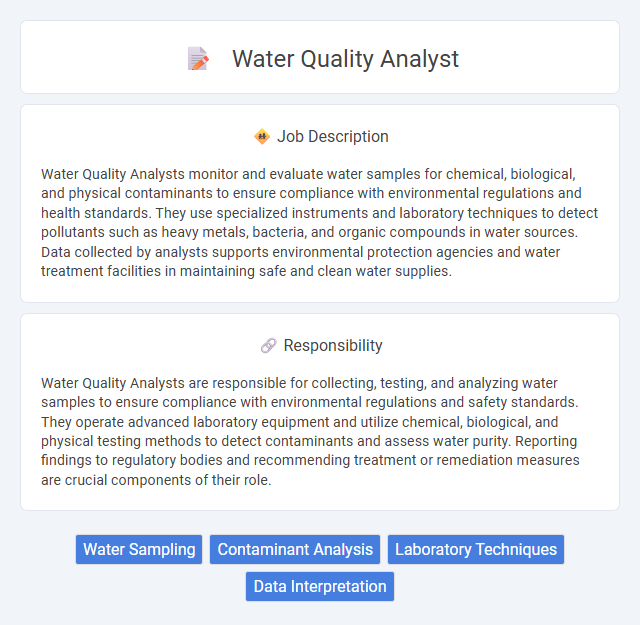
Water Quality Analysts monitor and evaluate water samples for chemical, biological, and physical contaminants to ensure compliance with environmental regulations and health standards. They use specialized instruments and laboratory techniques to detect pollutants such as heavy metals, bacteria, and organic compounds in water sources. Data collected by analysts supports environmental protection agencies and water treatment facilities in maintaining safe and clean water supplies.
Individuals with a keen attention to detail and strong analytical skills are likely well-suited for a Water Quality Analyst role, as the job involves assessing and interpreting water samples to ensure safety and compliance with environmental standards. Those comfortable working in laboratory settings and handling scientific equipment probably find the role manageable and fulfilling. However, candidates who prefer dynamic, less technical environments or have difficulty with repetitive tasks might struggle with the demands of this position.
Qualification
A Water Quality Analyst typically holds a bachelor's degree in environmental science, chemistry, biology, or a related field, with specialized training in water quality testing and analysis. Proficiency in using laboratory instruments such as spectrophotometers, chromatographs, and pH meters, along with knowledge of EPA regulations and water sampling protocols, is essential. Strong analytical skills, attention to detail, and experience with data management software further enhance job performance in monitoring and ensuring water safety standards.
Responsibility
Water Quality Analysts are responsible for collecting, testing, and analyzing water samples to ensure compliance with environmental regulations and safety standards. They operate advanced laboratory equipment and utilize chemical, biological, and physical testing methods to detect contaminants and assess water purity. Reporting findings to regulatory bodies and recommending treatment or remediation measures are crucial components of their role.
Benefit
Water Quality Analyst roles likely offer benefits such as comprehensive health insurance and retirement plans, which provide financial security and wellness support. Opportunities for professional development and certifications may enhance career growth and industry expertise. Flexible work schedules and fieldwork experiences could contribute to improved work-life balance and job satisfaction.
Challenge
Water Quality Analyst roles likely involve the challenge of accurately detecting contaminants and pollutants in various water sources under strict regulatory standards. The job probably requires navigating complex data sets and interpreting results to ensure water safety and compliance. Analysts might frequently encounter evolving environmental factors that demand continuous updating of testing methodologies.
Career Advancement
Water Quality Analysts play a critical role in assessing and ensuring the safety of water resources through rigorous testing and data interpretation. Career advancement opportunities include progressing to senior analyst positions, environmental science management roles, or specializing in regulatory compliance and environmental consulting. Continued education and certifications in environmental science, chemistry, and data analytics significantly enhance prospects for leadership roles within government agencies, private environmental firms, and research institutions.
Key Terms
Water Sampling
Water Quality Analysts conduct precise water sampling to assess contamination levels and ensure compliance with environmental regulations. They utilize advanced instruments and standardized protocols to collect samples from various sources, including rivers, lakes, and industrial discharge points. Accurate sampling enables the detection of pollutants such as heavy metals, pathogens, and chemical residues critical to public health and ecosystem sustainability.
Contaminant Analysis
Water Quality Analysts specializing in contaminant analysis use advanced techniques such as gas chromatography and mass spectrometry to detect pollutants like heavy metals, pesticides, and microbial pathogens in water samples. They ensure compliance with environmental regulations by accurately measuring contaminant concentrations and assessing potential health risks. Data interpretation and reporting provide critical insights for water treatment processes and public safety management.
Laboratory Techniques
Water Quality Analysts utilize advanced laboratory techniques such as spectrophotometry, titration, and chromatography to accurately measure chemical and biological contaminants in water samples. Mastery of standardized protocols like EPA Method 200.7 for metals analysis and Hach methods for nutrient detection ensures precise data for regulatory compliance. Proficiency in data interpretation and instrument calibration enhances reliability in monitoring water safety and environmental impact.
Data Interpretation
Water Quality Analysts specialize in interpreting complex datasets from water samples to assess contamination levels and ensure safety standards compliance. Proficiency in analytical software and statistical tools is essential for accurate data evaluation and identifying trends in water quality parameters such as pH, turbidity, and pollutant concentrations. Their expertise supports regulatory reporting and guides water treatment processes to maintain environmental and public health standards.
 kuljobs.com
kuljobs.com